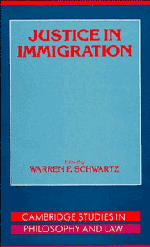Book contents
- Frontmatter
- Contents
- List of contributors
- 1 Immigration, welfare, and justice
- 2 Citizenship, the demands of justice, and the moral relevance of political borders
- 3 A two-country parable
- 4 Immigration, identity, and justice
- 5 Immigration, justice, and culture
- 6 Fear and loathing at the border
- 7 Immigration policy in liberal political theory
- 8 The welfare economics of immigration law: a theoretical survey with an analysis of U.S. policy
- 9 Just borders: normative economics and immigration law
- 10 Some caveats on the welfare economics of immigration law
- 11 The case for a liberal immigration policy
4 - Immigration, identity, and justice
Published online by Cambridge University Press: 18 March 2010
- Frontmatter
- Contents
- List of contributors
- 1 Immigration, welfare, and justice
- 2 Citizenship, the demands of justice, and the moral relevance of political borders
- 3 A two-country parable
- 4 Immigration, identity, and justice
- 5 Immigration, justice, and culture
- 6 Fear and loathing at the border
- 7 Immigration policy in liberal political theory
- 8 The welfare economics of immigration law: a theoretical survey with an analysis of U.S. policy
- 9 Just borders: normative economics and immigration law
- 10 Some caveats on the welfare economics of immigration law
- 11 The case for a liberal immigration policy
Summary
In general, political philosophers have not been terribly interested in the topic of immigration, although there are a few exceptions. In the early part of this century, a philosopher named Horace Kallen wrote a number of articles on the topic and even coined the term “cultural pluralism” to describe what he took to be the type of society that would result from the United States’ generous immigration policy if Americans sustained their commitment to tolerance and freedom. More recently, the articles of John Rawls discussing the kind of liberalism appropriate for a pluralist society such as our own have been indirectly motivated by the way in which the large-scale immigration of people from all over the world has made the United States one of the most heterogeneous of all liberal societies and, for that reason, a country that might become increasingly difficult to govern unless mutually acceptable and unifying terms of association can be sustained.
However, by and large, the focus of political philosophy has been on defining distributive justice within, and sometimes between, political societies. Yet how a state responds to outsiders who want to live within its borders raises questions of distributive justice. And more basically, a state's policy on immigration is connected to its sense of itself and its own identity. In this essay, I wish to pursue the connections between citizens’ sense of societal identity, the immigration policy pursued by that society's government, and social justice.
- Type
- Chapter
- Information
- Justice in Immigration , pp. 67 - 93Publisher: Cambridge University PressPrint publication year: 1995
- 10
- Cited by



